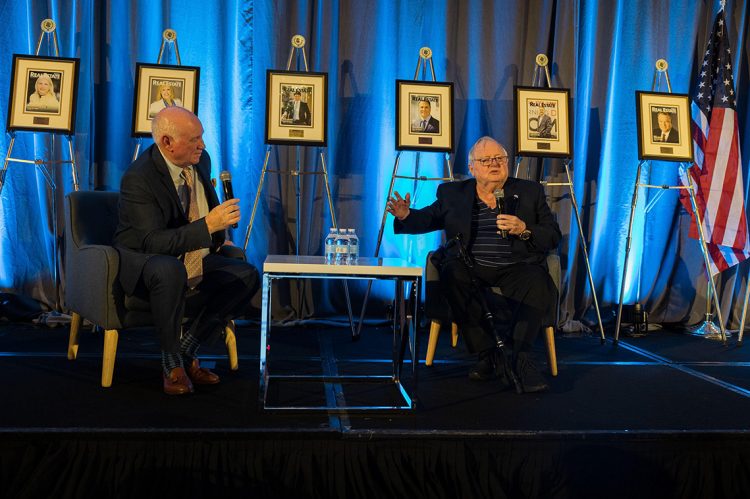Above, RE/MAX Holdings Co-Founder and Chairman Dave Liniger, right, and RISMedia President and CEO John Featherston, discuss the state of the real estate market at RISMedia’s CEO & Leadership Exchange in Washington, D.C. in September. Photo credit: Eric Torrens erictorrens.com
Shifting market conditions have sent ripples throughout the real estate industry, leaving many wondering what the future holds.
For some younger business models, the market shifts seem problematic after two to three years of prosperity. But, for those who have been around the block a few times, these changes are par for the course.
Agents and brokers have had to weather surging mortgage rates, slowing market activity, historic inflation and a shifting environment that has forced many to rethink their gameplans and adapt.
RISMedia President and CEO John Featherston and I recently sat down with RE/MAX Co-Founder and RE/MAX Holdings Chairman Dave Liniger to discuss the changing real estate industry and what’s on the horizon for RE/MAX as the latest economic and market cycle takes hold.
John Featherston: Every company has had to adapt in the wake of the pandemic. Tell us how the past couple of years have impacted RE/MAX, both positively and negatively.
Dave Liniger: We have 40% of our staff working outside the metro Denver area. We found that many of our jobs can be done remotely. At first, I was skeptical as to whether we’d be able to get real work done, but in reality, the staff is doing more each day than ever before.
So, it’s convenient that they can take the kids to soccer practice, drop them off and come back, but they miss the social component at the office, so I think you’ll see that this building will end up 60% to 70% staffed at least three to four days a week.
JF: Currently, the U.S. housing market has been undergoing its share of changes. In your opinion—and looking out over the next six to 12 months—what do you see happening in the U.S. marketplace, and how does that affect RE/MAX both domestically and internationally?
DL: RE/MAX does better than the average company during recessionary times because of the quality of the agents we’ve got. We don’t have the share of beginners and part-timers that drop out when the market turns around, so we actually see opportunities in the recessionary markets. We don’t hire hundreds of thousands of new people, and if you look at 2007 to now, we went from 800,000 REALTORS® to 1.6 million. As we look at it, we don’t see any decline.
Everyone got so deep into technology, but you can never, individually as a company, own all of your technology. We straightened out some of the lousy technology we were buying, and that worked. Basically, we will reallocate our monies, and we will probably close out some of our technologies and spin out of them, but we will increase our hiring in franchise sales, especially as Motto Mortgage is having this extraordinary success.
Jordan Grice: Over the years, the industry has seen several companies emerge with tech-focused models and venture capital-backing, which were touted as disruptors. Now we are seeing things shift a little in the market.
DL: The problem you’ve got is that technology is taking a dive, and the tech stocks are just getting hammered. It’s almost going to be like the dotcom bust 25 years ago. These 28-year-old analysts think that all brick-and-mortar is dead and that smart tech people are going to get rid of all of us worker bees. They are about to see what downsizing is.
JG: You’ve been through several market shifts and dips over the years and have come through them all. What’s your take on what’s going on?
DL: I did a speech once when the market went to hell, and I figured out the number of presidents that I worked under, starting with Johnson. I named them all in order, and I said, “In my history of having a real estate license, I’ve worked under these nine different presidents, and their associates and I made money every year.” I said, “Our first recession was in 1973, which was the year I founded the company. Fortunately, I was a college dropout, didn’t know what the hell a recession was, and had never read a Wall Street Journal. I just knew that people wanted to sell a house and buy a home.”
Then, I went through the first oil embargo and the second oil embargo. Then we had the savings and loan crisis where we had all the millions of foreclosures, and everyone said it’s never going to come back. Then we went through 2007. If you’re a dedicated full-time business person, you find a way to make it work. The world never stops changing. It never stops.
JG: When talking about the market and the recession prediction, how do you see RE/MAX faring as the market shifts and the changes occur?
DL: No problem. I’ve been in my career for 55 years, and our 50th anniversary with RE/MAX is in January. There are very few companies that are public that still have the founder as the majority owner. That’s a unique deal. I’ll tell you it was devastating back in 1967 when they changed the FHA rate from 5.5% to 5.75%. We thought it was the end of the world, yet 30 years later, they changed the rate to 16%, and RE/MAX agents were still out there selling houses. You learn to adjust, but quality rises to the top. Quality is when you’re getting 75% or 85% or higher in personal referrals or people who are buying again. They’re doing that because they trust RE/MAX agents.
We look at the Fed rates and say “been there, done that, bought the t-shirt so who gives a d**n.”
JG: What about newer agents that came in during the hot housing market of 2020 and 2021 who are now seeing things get a bit tougher in the industry?
DL: The real estate business, for a beginner, even in a good market, is a tough job. Nobody pays salaries. Nobody pays for damages. And so, you’re trying to learn a business such as prices, valuations, neighborhood values, schools, systems and stuff like that while trying to find buyers and sellers. If you’re around for five years and you’re not getting a lot of referral business, you just quit because it’s too hard, but if you’ve been around five years and you’re getting lots of referrals, and people love the service you give, now it’s an easy job. The world isn’t changing every day, so when interest rates go up or go down, people still have to find a place to buy, and the thing is, the interest rates were unnaturally low at 2.9%. Everybody got used to thinking that’s the real world.
The worst thing a real estate agent can have is a good memory. That house you sold 15 years ago went for $110,000, and today, you’re selling it for $450,000—but that’s what prices do. If you keep thinking, “well, interest rates are 2.9%, and now they are 6%,” well, the average interest rate in the last 50 years has been 7.4%, but averages are worthless. Even though rates have bounced between six and seven this year, there’s still a tremendous pit of demand from millennials who want to get their foot in the door.
JG: You and Gail are woven into the fabric of RE/MAX. Why has it remained important to you to stay involved to this day?
DL: We started with nothing. When we started expanding with franchising, we didn’t have a lot of money, and our franchisees didn’t have a lot of money. We stayed in their houses when we set them up in business. We became lifetime friends, and we were doing six meetings a year as regional owners together. It was a friendship association more than a business relationship.
The fabric of the organization became a group of friends, not just business associates. Sometimes when you start a company, the original founders are so tightly woven together that you are still friends 40 and 50 years later. Sometimes, when the entity is built, and you’re established, and you hire people, they’ll never have the sense of accomplishment or the sense of responsibility to each other that we had when we were building it, and there are two different phases here.
Building an organization and staying in it builds lifelong bonds of friendship and respect. Joining an organization that was built is entirely different. You’re still going to have relationships and friendships, but you’ll never have the fact that we went through the war together. We were all broke together, and we all made it together.
JG: Looking back at when you founded RE/MAX until now and even into the future, what are some significant milestones that you want the company to hit?
DL: Obviously, we continue to expand throughout the world, and just like in the U.S., we didn’t have overnight success. That’s achieved over 40 or 50 years, so we look at all the countries that we set up, and that’s 110—120 with territories—and it’s fun for us having been founders to see people who are 20 and 30 years younger than us that are hitting their stride and accomplishing in their countries what we accomplished in ours. For us, the satisfaction is watching hundreds and hundreds of people excel and succeed; and maintaining that relationship to where we go to a convention, and I know 2,000 to 3,000 people personally, going back 30 or 40 years. That’s the fabric of a company. That’s the heart of a company. And I’m very fortunate to be a founder.












